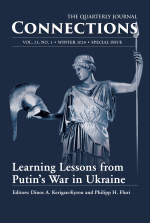The purpose of this study is to identify the role and skills of critical thinking in the context of hybrid warfare, as well as to explore ways to develop it. The following methods were used in the study: system and complex analysis, structural and functional analysis, historical analysis, analysis and synthesis, critical analysis, conceptual modeling, and generalization of existing knowledge. The findings revealed that conventional approaches to ensuring national security, such as increasing military power, are insufficient in the context of hybrid warfare. It is argued that in order to strengthen Ukraine’s national security, it is crucial to adopt new approaches, particularly those focused on developing the intellectual potential of society. The study proves that the purposeful development of citizens’ critical thinking can play a key role in increasing Ukraine’s resilience to the information and psychological threats posed by hybrid warfare. Critical thinking enables individuals to better identify and resist fakes, propaganda, and manipulation. The practical significance of this study lies in substantiating the strategic importance of critical thinking for Ukraine’s national security.
Reviewed article
Armed Violence as a Challenge to National Security: Critical Thinking Perspectives
Article statistics
Bibliography
Acomi, Nicoleta, “Digital Citizenship ‘Media and Information Literacy’ Course,” DIGCIT project deliverable, September 26, 2022, https://doi.org/10.5281/zenodo.7112814.
Arbeláez-Campillo, Diego Felipe, et al., “Contributions of Critical Thinking as a Form of Participation and Political Deliberation,” Amazonia Investiga 9, no. 27 (2020): 5-12, https://doi.org/10.34069/AI/2020.27.03.1.
Baron, Jonathan, Thinking and Deciding, 5th ed. (Cambridge: Cambridge University Press, 2023).
Cherepovska, Nataliia, “Media Psychological Features of Youth Patriotism in the Information Age,” Scientific Studios on Social and Political Psychology 27, no. 2 (2021): 188-200, https://doi.org/10.61727/sssppj/2.2021.188.
Collier, Michael W., Security Analysis: A Critical Thinking Approach (Richmond: Encompass Digital Archive, 2023), https://encompass.eku.edu/ekuopen/6/.
Dycus, Stephen, et al., “Information Security in the Context of National Security,” in National Security Law (Frederick: Aspen Publishing, 2022), 37-72.
Garasim, Pavlo, “The Role and Place of Public Control in the Legal Mechanism for the Prevention of Penitentiary Crime in Ukraine,” Scientific Journal of Polonia University 55, no. 6 (2022): 145-150, https://doi.org/10.23856/5519.
Haque, Ubydul, et al., “The Human Toll and Humanitarian Crisis of the Russia-Ukraine War: The First 162 Days,” BMJ Global Health 7, no. 9 (2022): e009550, https://doi.org/10.1136/bmjgh-2022-009550.
Hubeladze, Iryna, “Community Identity in the Conditions of Interstate Military-political Confrontation: Conceptualization of the Concept,” Scientific Studios on Social and Political Psychology 29, no. 1 (2023): 10-16, https://doi.org/10.61727/sssppj/1.2023.10.
Humeniuk, Vasyl, “Foreign Experience of Post-war Transformation of Public Administration and Lessons for Ukraine,” Economy of Ukraine 65, no. 8 (729) (2022): 34-54, https://doi.org/10.15407/economyukr.2022.08.034.
Johanson, Terence, “Understanding National Security as Contextual: The Implications for Small State Defence Policy,” National Security Journal 4 (2022), https://doi.org/10.36878/nsj20220712.04.
Komziuk, Volodymyr T., et al., “Promising Directions for Ensuring National Security under Martial Law,” Lex Humana 15, no. 1 (2023): 509-520, https://seer.ucp.br/seer/index.php/LexHumana/article/view/2449.
Kurylo, Vitalii, et al., “Pedagogic Technology of Formation of Readiness for Self-Development in Students from the Occupied Territories and Delimitation Line in the East of Ukraine in Conditions of Temporarily Displaced Higher Education Institutions,” Journal of Educational Sciences & Psychology 11 (73), no. 2 (2021): 39-53, https://jesp.upg-ploiesti.ro/phocadownload/jurnal_2021_2/06.pdf.
Legucka, Agnieszka, “Interview with Agnieszka Legucka: The Russo-Ukrainian War Is a Clash Between Two National Armies and Two Global World Views,” Forum for Ukrainian Studies, May 4, 2023, https://ukrainian-studies.ca/2023/05/04/interview-with-agnieszka-legucka-the-russo-ukrainian-war-is-a-clash-between-two-national-armies-and-two-global-world-views/.
Li, Yuchong, and Qinghui Liu, “A Comprehensive Review Study of Cyber-attacks and Cyber Security; Emerging Trends and Recent Developments,” Energy Reports 7 (November 2021): 8176-8186, https://doi.org/10.1016/j.egyr.2021.08.126.
Müller, Frank I., and Matthew Aaron Richmond, “The Technopolitics of Security: Agency, Temporality, Sovereignty,” Security Dialogue 54, no. 1 (2023), 3-20, https://doi.org/10.1177/09670106221141373.
Namwambah, Tom Destiny, “Essentiality of Critical Thinking to National Security,” International Journal of Humanities and Social Science Research 6, no. 3 (2020): 37-45, https://socialsciencejournal.in/assets/archives/2020/vol6issue3/6-3-16-592.pdf.
Nikitin, Anatolii, Oleksandr Tarasenko, and Oleksandr Dubenko, “Legal and Economic Foundations of the National Security of Ukraine: State and Prospects,” Baltic Journal of Economic Studies 8, no. 3 (September 2022): 143-153, https://doi.org/10.30525/2256-0742/2022-8-3-143-153.
Nikitin, Anatolii, Oleksii Vdovychenko, and Victor Beschastnyy, “The Role of Law Enforcement Agencies in Ensuring National and Economic Security of Ukraine,” Baltic Journal of Economic Studies 8, no. 4 (2022): 110-116, https://doi.org/10.30525/2256-0742/2022-8-4-110-116.
Parasnis, Eesha, “The Implications of Social Media for Adolescent Critical Thinking from an Information and Advertising Literacy Context: A Brief Review,” The Serials Librarian 83, no. 1 (2022): 9-15, https://doi.org/10.1080/0361526X.2022.2030850.
Pochwatko, Grzegorz, and Lyubov Naydonova, “Mediated Communication and Refugee Resilience: A Social Psychological Model,” Scientific Studios on Social and Political Psychology 29, no. 1 (2023): 28-37, https://doi.org/10.61727/sssppj/1.2023.28.
Popper, Steven W., “Designing a Robust Decision-Based National Security Policy Pro-cess: Strategic Choices for Uncertain Times,” in Adaptive Engagement for Undergoverned Spaces: Concepts, Challenges, and Prospects for New Approaches, ed. Aaron B. Frank and Elizabeth M. Bartels, RR-A1275-1 (Santa Monica: RAND Corporation, July 2022), 287-312.
Postupna, Оlena, and Oleksii Stepanko, “Scientific Research of the Problems of Public Administration in the Humanitarian Sphere of Ukraine: Preliminary Analysis and Generalization,” Bulletin of the National Technical University “KhPI,” Series: Actual Problems of Ukrainian Society Development, no. 1 (2022): 43-49, https://doi.org/10.20998/2227-6890.2022.1.07.
Pries, Ludger, “Organized Violence as a Never-ending Story? Reflections in Light of the Russian Aggression against Ukraine,” Frontiers in Sociology 7 (August 2022), 95220, https://doi.org/10.3389/fsoc.2022.952209.
Schmidt, Eric, “AI, Great Power Competition & National Security,” Daedalus 151, no. 2 (2022): 288-298, https://doi.org/10.1162/daed_a_01916.
Sprincean. Serghei, Anastasia Catan, and Sanda Țoncu, “Theoretical Perspectives on Promoting Human Security through Mechanisms of the State of Law,” Vector European, no. 2 (2022): 30-35. – in Moldovan
Teferra, Zelalem Mogessie, “Regulating a ‘State of Exception’ in Times of War: The Legal Regime Applicable to Derogation in Situations of Armed Conflict,” Journal of Conflict and Security Law 28, no. 2 (Summer 2023): 253-284, https://doi.org/10.1093/jcsl/krac032.
Ternavska, Victoria, “Legal Status of Persons Affected by the Military Aggression of the Russian Federation against Ukraine (Constitutional and Legal Aspect),” The Scientific-Practical Law Journal “Almanac of Law,” no. 13 (2022): 331-339. – in Ukrainian
Vovk, Svitlana, et al., “Mechanisms of determination of armed violence in the modern world,” Amazonia Investiga 12, no. 66 (2023), 347-354.

